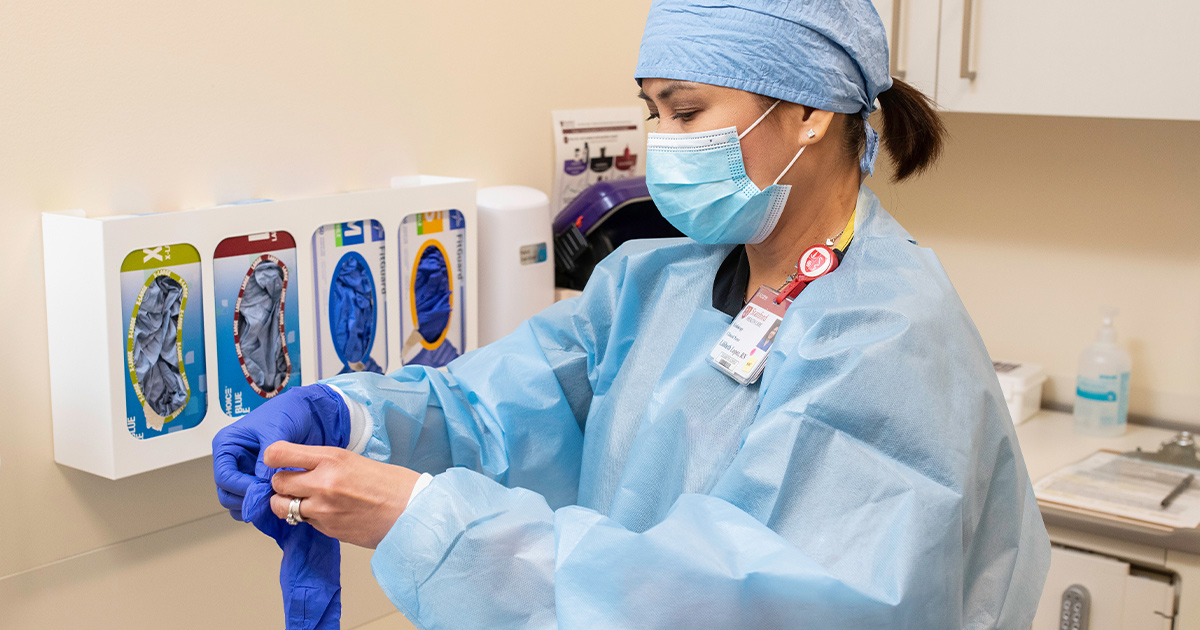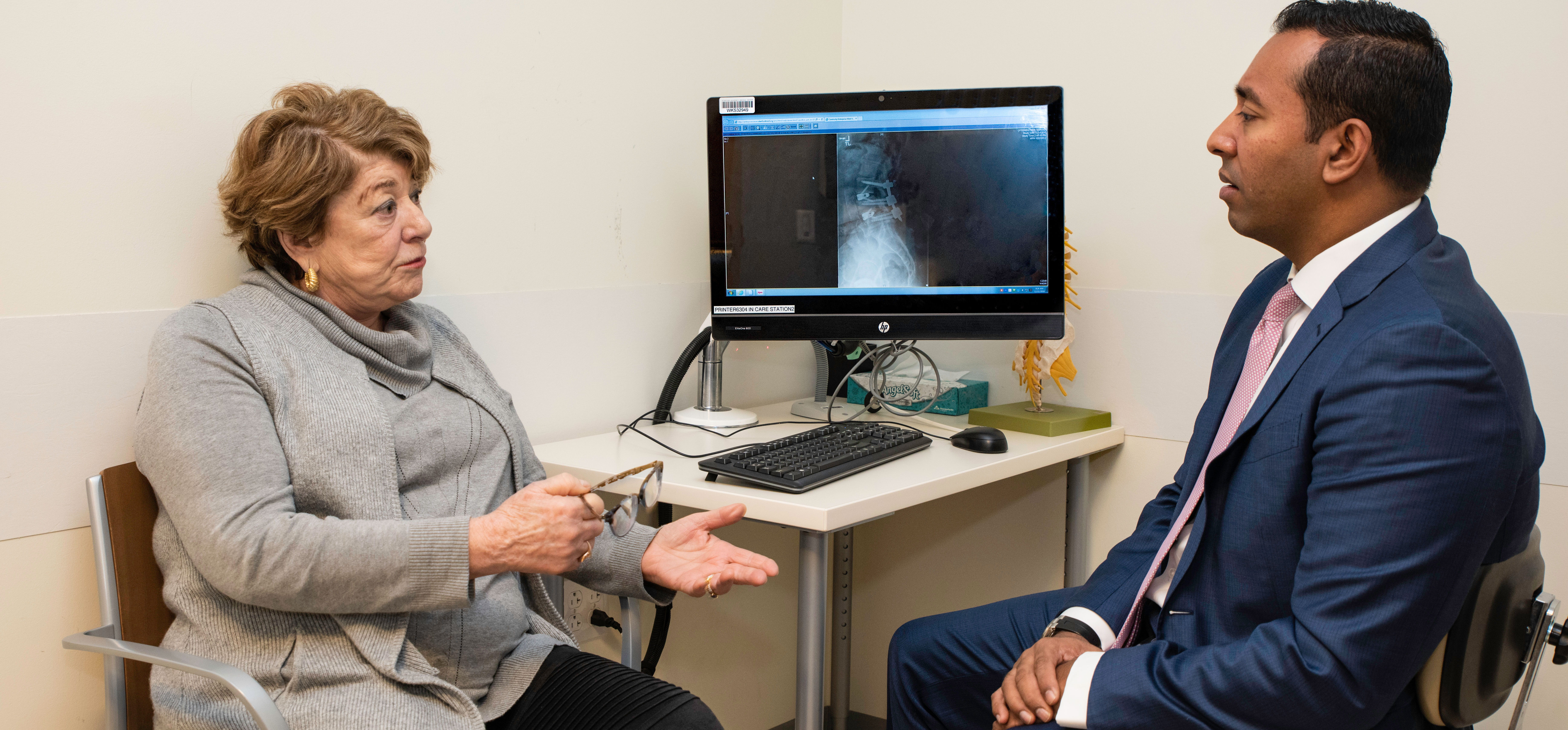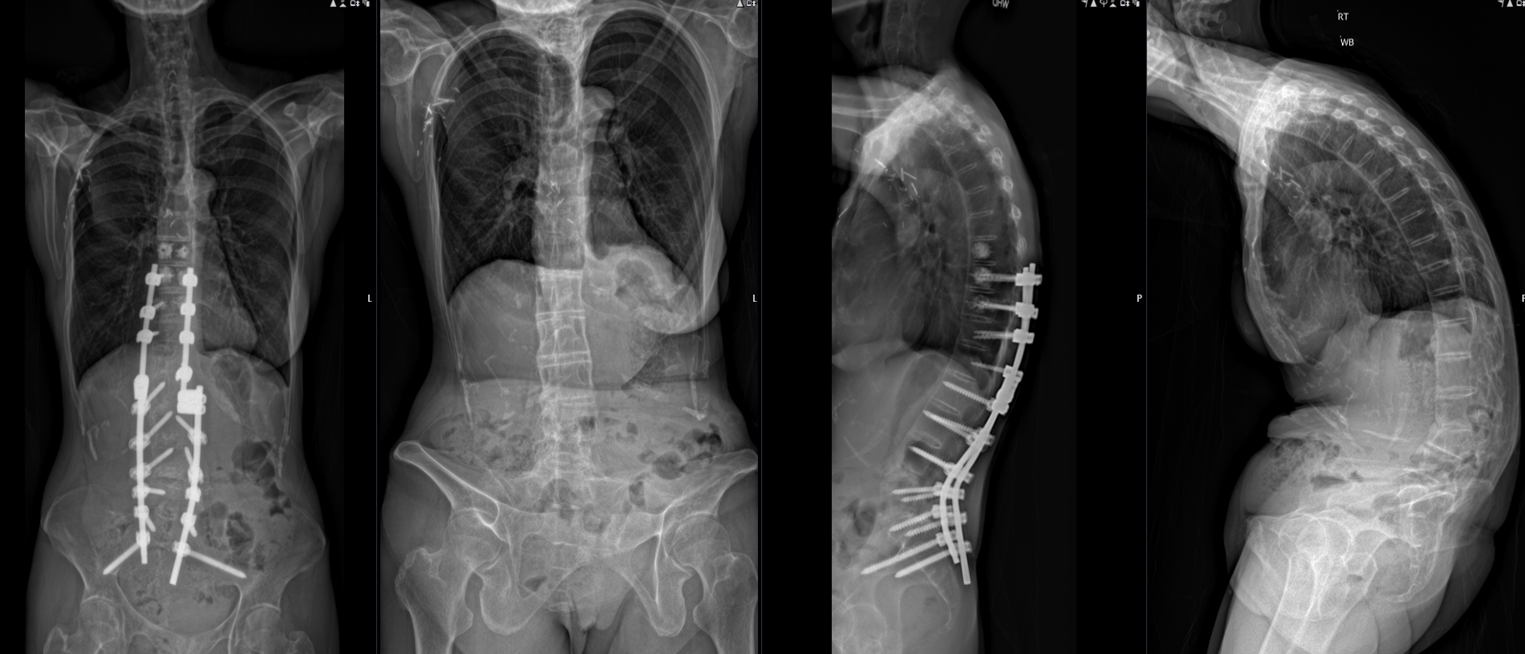Stanford Medicine Spine Center
At Stanford Medicine Spine Center, the brightest minds collaborate to create a care plan tailored to you, treating conditions that range from a pinched nerve to a spinal fracture to chronic pain.
Call us today at 650-725-1125, or schedule a callback, so you can get back to enjoying your life.
What We Offer You for Spine Care
- Specialized expertise: We treat common and complex disorders of the neck, spine, back, head, and nerves.
Go to Conditions Treated - A team-based approach: Neurosurgeons, orthopaedic surgeons, pain management specialists, physiatrists, and other experts work together.
Go to Your Care Team
- Personalized treatments: Advanced imaging technologies and diagnostic tools identify your triggers.
Go to Treatments
- Easy access: Spine care specialists can see you either in person at one of our five convenient locations or by video visit from the convenience of your own home.
Go to Accessing Care

The experts at the Stanford Medicine Spine Center treat all spinal conditions involving the spine, back, head, neck, and nervous system. We manage chronic, long-term issues, as well as acute problems that come on suddenly. We work closely with you to outline a treatment plan designed to help you manage symptoms and restore your quality of life. Our doctors actively research new approaches to spinal care and use their research discoveries to improve your treatment options.
Comprehensive care at the Spine Center includes prevention and wellness programs, plus patient education to help you understand your condition and treatment. These resources are designed to help you leave the hospital sooner, recover faster, get back to your normal lifestyle as soon as possible, and maintain long-term spinal health.
We treat all spinal conditions, even those once considered untreatable.
Our team specializes in diagnosing spinal conditions and delivering compassionate care and innovative treatments, even for conditions once thought to be untreatable. We offer the full range of spinal treatments, emphasizing the most conservative approach, including noninvasive and minimally invasive techniques whenever possible.
Advanced Diagnostics
Our goal is to ensure you receive the right diagnosis as quickly as possible, so we can provide the right treatment right away. Advanced imaging technology and diagnostic techniques enable us to pinpoint the cause of your condition and tailor a care plan to treat it. Our diagnostic tools include:
- Efficient imaging tools such as EOS Imaging System that can take two simultaneous images of the skeletal system and uses low-radiation imaging to reduce X-ray exposure
- Functional anesthetic discogram to pinpoint the source of pain for precise treatment planning
- High-definition fiber tractography (HDFT) plus functional perfusion MRI to more effectively distinguish tumors from healthy tissues
- Intraoperative imaging to help guide doctors in real time during surgical procedures
Surgical Treatments
We offer personalized treatment options based on our understanding of your condition and your specific medical, emotional, and daily living needs. We deliver a full range of surgical options, using the most advanced therapies and technologies.
We perform minimally invasive surgical procedures, complex reconstructive spinal surgery, and innovative techniques that improve the safety and outcomes of disc, fracture, and tumor treatments. All procedures are designed to help shorten hospital stays, shorten recovery time, reduce health system costs, and enable you to resume your normal activities as soon as possible.
Surgical procedures include:
Disc treatments
- Minimally invasive decompression
- Microdiscectomy: a minimally invasive procedure to relieve pain caused by a herniated disc
- Lumbar microdiscectomy with annular closure
- Total disc replacement
- Motion preservation techniques
Corrective and reconstructive treatments
- Complex spinal reconstruction
- Craniovertebral junction reconstruction
- CyberKnife stereotactic radiosurgery: a robotic system that delivers targeted radiation
- Minimally invasive fusion techniques
- Reconstructive peripheral nerve surgery
- Scoliosis and kyphosis deformity correction
- Skull base spine surgery
- Spinal fusion: joining two or more vertebrae into one bone)
Fracture treatments
- Cervical, thoracic, and lumbar decompression: removal of bone to relieve pressing and pinching of spinal nerves
- Kyphoplasty: surgical filling of a collapsed vertebra using a balloon to create a cavity and filling it with cement
- Stabilization of spinal fractures and dislocations
- Vertebroplasty: surgical filling of a collapsed vertebra with cement
Tumor treatments
- Open and microlaminectomy: minimally invasive surgery to treat bone spurs pressing on spinal nerves
- Stereotactic radiosurgery (radiation therapy) for spine tumors
- Tumor excision and reconstruction
Nonsurgical Treatments
Nonsurgical Procedures
Treatments that don’t rely on surgery include:
- Conventional medications
- Discography: injection of X-ray dye to determine if a disc is the cause of back pain
- Epidural steroid: an injection to help relieve pain caused by inflamed spinal nerves
- Facet joint injection: use of a numbing anesthetic to block pain
- Nerve root blocks: injection of an anesthetic into the area where a nerve branches off the spinal cord
- Radiofrequency ablation: use of an electrical current to heat nerve tissue
- Trigger point injection: injection of an anesthetic and steroid into a muscle “knot”
Rehabilitation and Conditioning Programs
We coordinate with Physical Medicine and Rehabilitation to offer:
- Physical and occupational therapy
- Spine rehabilitation programs
- Dietary counseling with Stanford Health Care nutritionists
- Back-to-work referral to help prevent future injury
Pain Management
We offer care for chronic pain, including:
- Transcutaneous electrical nerve stimulation (TENS): the use of electrical current to relieve pain
- Peripheral and other nerve blocks
- Spinal column stimulators: implanted electrical devices that stimulate the spine to relieve pain
- Medication
- Counseling
Clinical Trials
Our specialists deepen the understanding of spine care through research and clinical trials. These studies evaluate new medical techniques and technologies to diagnose, treat, or prevent spinal conditions. As a Stanford Health Care patient, you have access to these exciting new approaches.
Open trials refer to studies currently recruiting participants or that may recruit participants in the near future.
View Spine Patient Stories
Your Spine Center Care Team
Our team members collaborate closely to make sure you get complete care for any spinal condition. We meet regularly to consult on the treatment of each complex case. These case reviews help ensure that your customized care plan benefits from our team members’ shared expertise and experience.

Your Providers
Neurosurgery Spine Specialists
Neurosurgery spine specialists are experts in diagnosing and treating conditions involving the nervous system, brain, and spinal cord. Our specialists have extensive training and experience managing all spinal conditions, even the most complex.
View All {0} Spine NeurosurgeonsOrthopaedic Spine Specialists
Orthopaedic spine specialists excel in the diagnosis and surgical treatment of conditions involving the musculoskeletal system, with an emphasis on the spinal cord. Our orthopaedic specialists are highly trained and experienced in treating a wide range of spinal conditions.
View All {0} Spine SurgeonsPhysical Medicine and Rehabilitation Doctors
Physical medicine and rehabilitation specialists, also called physiatrists, provide nonsurgical treatment for pain and other conditions involving the musculoskeletal system, including the spinal cord.
View All {0} PhysiatristsAdvanced Practice Providers (APPs)
Our skilled physician assistants (PAs) and nurse practitioners (NPs) are health professionals who practice medicine under a doctor's supervision in medical and surgical settings. They can perform routine exams, order lab work and X-rays, write prescriptions, and help to provide care that promotes a healthy lifestyle. Our APPs meet weekly to discuss patient needs.
View All 13 Advanced Practice ProvidersStanford is an Academic Medical Center, which is a type of hospital setting where doctors teach the entire spectrum of medical education. Students range from beginning medical students to fully licensed and practicing doctors completing advanced sub-specialty training. Stanford Medicine is a partnership between Stanford University School of Medicine and Stanford Health Care. Since Stanford is a teaching hospital, you can expect to meet many providers and providers in training.
- Attending Physician: a doctor who supervises doctors in training or in medical school
- Fellow: a doctor doing postgraduate level work and specializing in care of patients with specific conditions
- Resident: a doctor who has graduated from medical school and is in training (also called “residency”) here at Stanford. A resident is also called an intern
- Medical Student: a student who is currently enrolled in medical school with the goal of becoming a doctor

Extended Care Team
Working with our neurosurgeons, orthopaedic surgeons, neurologists, and physiatrists are doctors from related specialties along with other health care professionals.
Neurologists
Neurologists specialize in the health of the nervous system.
View All {0} General NeurologistsPain Management Specialists
Pain management specialists help patients decrease pain and suffering, return to a maximum level of functioning and independence, and restore quality of life.
View All {0} Pain Management SpecialistsNeuroradiologists
Neuroradiologists are specialists in using radioactive materials, X-rays, and imaging systems to diagnose and treat conditions of the nervous system, spine, and brain.
View All {0} NeuroradiologistsNeuropsychiatrists
Neuropsychiatrists are specialists in treating mental disorders associated with the nervous system.
View All {0} NeuropsychiatristsEndocrinologists
Endocrinologists are specialists who treat conditions such as osteoporosis, which may cause bone and spine fractures.
View All {0} EndocrinologistsNeuro-Oncologists
Neuro-oncologists are specialists in diagnosing tumors and treating them with medications.
View All {0} Neuro-oncologistsMedical Assistants
Medical assistants bring you to your exam room after you check in for appointments and may take your vital signs before your doctor sees you.
New Patient Coordinators
Our coordinators contact you before your first appointment and help you prepare by providing the information you need to know and bring with you.
Patient Access Representatives
Our patient access representatives greet you at the front desk and register you for your appointments.
Research Coordinators
If you qualify for a clinical trial, our research coordinators guide you through the process. They educate you about what to expect during the study, answer your questions, and schedule your appointments.

Support Services
We take care of the details, so you can focus on your health and wellness. Our spine specialists work as a team to coordinate every aspect of your care. We also offer a wide range of support services to promote healing and improve your quality of life:
- Lifestyle Modification Support
- Nutrition Services
- Spiritual Care
- Stanford Health Library
The Stanford Medicine Spine Center provides seamless access to all spine care services—from diagnostic evaluation to treatment and follow-up. We make every effort to coordinate your appointments so that you can see multiple providers, as needed, during a single, convenient visit. We continue to offer safe, in-person appointments. We also have expanded our telehealth appointment options, providing convenience and access to our experts through video visits.
Stanford Health Care remains your partner in health. From cleaning to universal masking to testing, we’re taking every precaution so you can safely get the care you need. Learn how we’re protecting against COVID-19 »
Frequently Asked Questions
We participate in a wide range of insurance plans. View the list of insurance plans accepted by Stanford Health Care
Have insurance or pre-authorization questions? The Patient Financial Clearance team is available Monday – Friday, 8 a.m. – 5 p.m., to answer your questions. Please call 650-724-4445 or 1-877-291-7335 (toll free).
When choosing a doctor, it’s important to consider the doctor’s clinical training, experience, and expertise in a specialized area that matches your health care needs.
You can find the right Stanford doctor for you by using our doctor directory and filtering the results based on a medical category, specialty, or doctor’s last name. View our list of doctors
Yes, Stanford Health Care offers financial assistance for patients who are uninsured or underinsured. Meet with one of our financial counselors to find the best approach to paying for your health care. Financial counselors are available Monday through Friday from 8:00 a.m. – 5:00 p.m. Learn more about financial assistance services
We offer a number of support services, including support groups, interpreter services, nutrition services, a health library, and a variety of classes and events. Learn more about our support services
You will need to have the following items with you when you check in:
- Insurance card
- A form of payment for any copays or deductibles
- One form of photo ID:
- Valid state-issued driver’s license
- Valid state-issued ID card
- Valid passport
- Valid U.S. military ID card
- Valid U.S. Permanent Resident Card
Please print, fill out, and return the Medical Record Release Form to your new patient coordinator. The medical release form is an authorization form for external facilities to release medical records to Stanford Health Care.
Always feel free to bring someone with you to your appointments. A family member or friend can help ask questions, remember the information your care team gives you, and provide support.
Write down your questions before your appointment and rank them in order of importance, beginning with the most important ones. If there isn’t enough time to have all your questions answered during your appointment, ask your doctor who you can speak with to get your other questions answered.
You have multiple options when it comes to paying your bill.
- Online:
- You can pay your bill in MyHealth or the MyHealth mobile app, our secure health information tool for patients.
- You can also pay as a guest without creating a login.
- By mail:
- Stanford Health Care - P.O. Box 740715, Los Angeles, CA 90074-0715
- By calling a Customer Service Representative at 1-800-549-3720, Monday – Friday, 8 a.m. – 5 p.m.
For more information about billing, visit our Billing page.
Patient billing services at Stanford Health Care are provided by the billing office. To inquire about a bill that you received, please contact customer service:
Stanford Health Care Billing
Monday – Friday, 8 a.m. – 5 p.m.
1-800-549-3720
We offer a number of support services, including support groups, interpreter services, nutrition services, a health library, and a variety of classes and events. Learn more about our support services
To determine if a clinical trial is right for you, talk to your doctor. He or she can refer you to a research coordinator for more information on studies that may be right for your specific condition.
You can also find the guidelines for who can participate in a particular clinical trial online. However, it is best to work with your doctor to decide the right care approach for your needs.
Many of our programs are available to international patients.
Our International Medicine Services team can help you find the right doctor, estimate medical costs, book travel, and get you information about Stanford Health Care programs and services.
Please call +1 650-723-8561 or email IMS@stanfordhealthcare.org to get started.
For Referring Physicians
PHYSICIAN HELPLINE
Fax: 650-320-9443
Monday–Friday, 8 a.m.–5 p.m.
Stanford Health Care provides comprehensive services to refer and track patients, as well as the latest information and news for physicians and office staff. For help with all referral needs and questions, visit Referral Information.
You may also submit a web referral or complete a referral form and fax it to 650-320-9443 or email the Referral Center at ReferralCenter@stanfordhealthcare.org.
Returning Patient
New Patient or Questions
For questions or to request an in-person or telehealth appointment
with a spine specialist, call 650-725-1125, or schedule a callback.
Stanford Neurosurgery Clinic in Santa Cruz
1595 Soquel Drive, Suite 360
Santa Cruz, CA 95065
Stanford Orthopaedics and Sports Medicine in Emeryville
6121 Hollis Street, Suite 900
Emeryville, CA 94608
Spine Center Video Visits Available
Please call 650-725-1125 to schedule.
Stanford Orthopaedics and Sports Medicine in Los Gatos
555 Knowles Drive, Suite 201
Los Gatos, CA 95032
Stanford Orthopaedics and Sports Medicine in Pleasanton
5725 W Las Positas Blvd., Suite 200
Pleasanton, CA 94588











